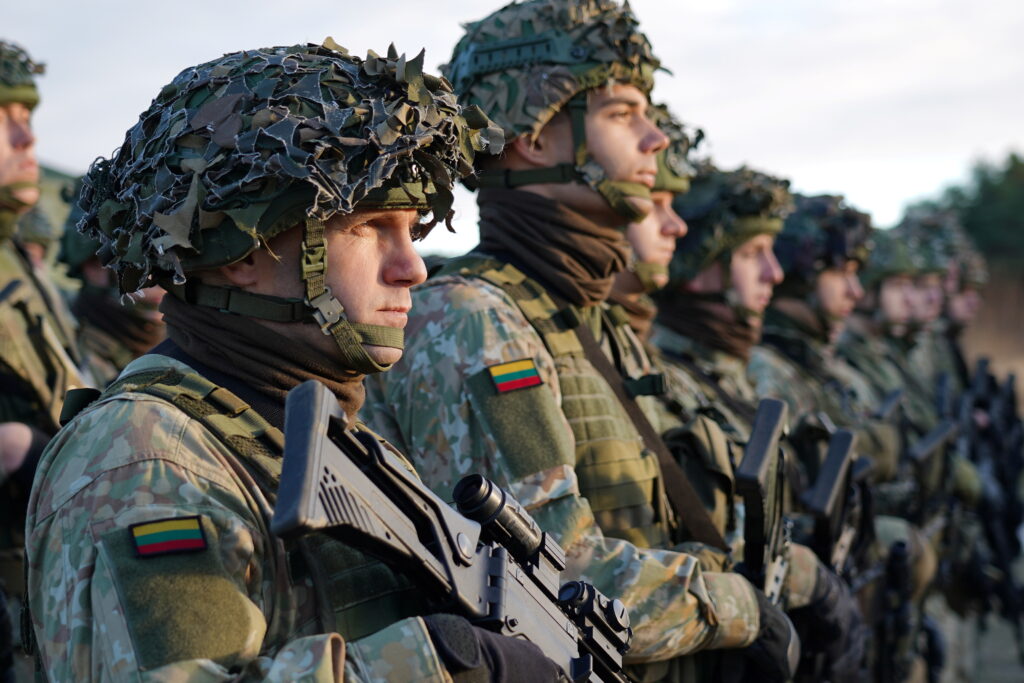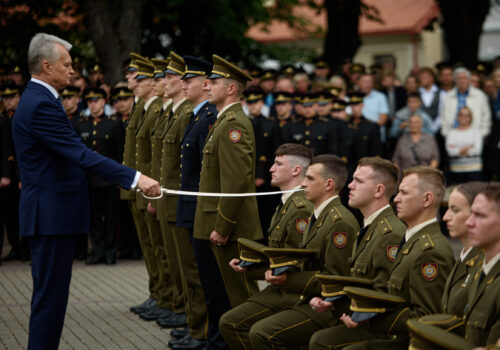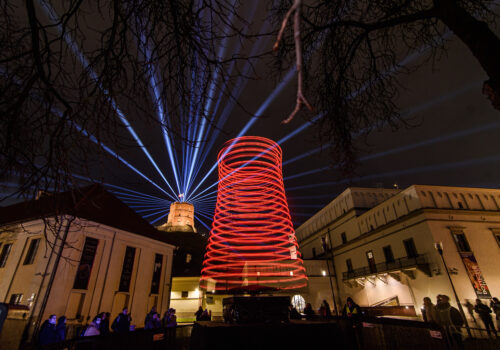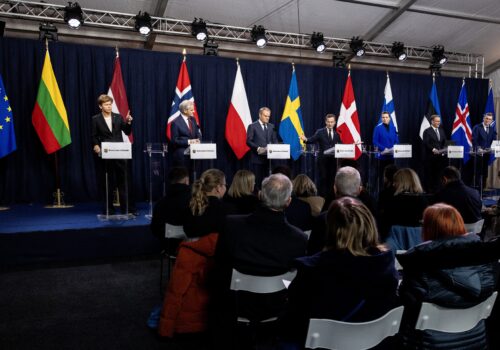VILNIUS—“Never again!” We heard these words often from Lithuanians of all ages on a recent one-week Atlantic Council study trip to Lithuania. We heard them from people early in their careers, military officers, and the most senior officials in the government, all of whom recounted stories of what living in the Soviet Union had been like for their parents or grandparents from the annexation of Lithuania at the end of World War II until independence was regained in the early 1990s. They were stories of imprisonment, torture, and exile to Siberia.
Since Russia’s full-scale invasion of Ukraine in early 2022, Lithuania, a small NATO ally of about three million people, has taken seriously the threat of a more aggressive and revanchist Moscow led by Russian President Vladimir Putin. The Russian leader has called the dissolution of the Soviet Union one of the greatest tragedies of history and has dedicated his regime to reasserting Russia’s dominance in the former Soviet space.
Amid US calls for Europe to take more responsibility for its own defense, Lithuania has been investing in its military.
We visited the borders with both Belarus and the Russian exclave of Kaliningrad. At the former, Lithuanian border guards told us of many cases of so-called “hybrid warfare” by the oppressive Belarusian regime, including pushing South and Central Asian migrants across the border and using drones and balloons to smuggle cheap Belarusian cigarettes into Lithuania. In Kaliningrad, Russia has built a heavily militarized province. Looking across the border bridge, which is now only open to pedestrian traffic, we saw a dark and foreboding city very different from the modern and free Lithuanian side.
Amid US calls for Europe to take more responsibility for its own defense, Lithuania has been investing in its military. Vilnius will increase its defense spending to 5 percent of its gross domestic product (GDP) in 2026, competing with Poland for the highest percentage of GDP spent on defense by a NATO country and far above the current level of US defense spending as a proportion of GDP.
In the past few years, Lithuania has spent billions of dollars on new weapons systems, including from the United States. It has also built modern infrastructure for its own forces, for a German brigade expected to deploy in the next few years, and for a relatively small US rotational force in the country. It has taken the lead in constructing a liquefied natural gas (LNG) terminal at the port city of Klaipėda that has allowed the Baltic states and new NATO ally Finland to end their dependence on Russian natural gas and import LNG from elsewhere. Last year, half of the gas imported at this terminal came from the United States. Lithuania has also provided more assistance for Ukraine’s fight for freedom than one might expect. On our trip to the far corners of the country, we saw many signs that Lithuanians support Ukraine’s own “never again” fight.
But Lithuania is a small country with a relatively flat landscape, which does not lend itself to fighting a potentially reconstituted Russian military in a few years. Lithuanians need a strong NATO to deter the threat and make it clear to Putin that the country is not low-hanging fruit, ripe for the Kremlin to pick off. Lithuanians welcome the Germans and others who are eager to help with deterrence, but they know that only the United States and a physical US presence in the country can truly deter Russia. The Lithuanians are trying to show they deserve that support.
When then NATO Secretary General Jens Stoltenberg spoke to a joint session of Congress in 2019, he said that the point of NATO is that “it’s good to have friends.” It’s good for the United States as it faces the challenges of the twenty-first century, he explained, and it’s good for US allies. “We are stronger and safer when we stand together,” he said. Stoltenberg received a bipartisan standing ovation.
Six years later, the stakes are considerably higher, as Russia’s aggression has only become bolder. The United States is urging its friends to do more for themselves and strengthen their defenses. Lithuania, in its resolve to “never again” be dominated by Moscow, is seeking to do just that.
James A. Hursch is a nonresident senior fellow with the Transatlantic Security Initiative in the Scowcroft Center for Strategy and Security at the Atlantic Council. He previously served as the director of the Defense Security Cooperation Agency and as deputy defense advisor at the US Mission to NATO.
Note: The Atlantic Council delegation’s visit to Lithuania was sponsored by the Lithuanian Ministry of National Defense.
Further reading
Thu, Jan 2, 2025
Lithuania prioritizes defense spending amid growing Russian threat
UkraineAlert By Agnia Grigas
Lithuania's new government is planning to increase defense spending as the Baltic nation faces up to the growing threat posed by Putin's Russia amid uncertainty over the US role in European security, writes Agnia Grigas.
Wed, Feb 5, 2025
Baltic states unplug from Russia’s power grid—but Moscow still looms over critical infrastructure
New Atlanticist By Justina Budginaite-Froehly
Breaking from the Russian system, Estonia, Latvia, and Lithuania are about to synchronize their electricity systems with the Continental Europe Network.
Wed, Dec 4, 2024
How the Nordic-Baltic states are leading the way on European security
New Atlanticist By Anna Wieslander
Denmark, Estonia, Finland, Iceland, Latvia, Lithuania, Norway, and Sweden are becoming increasingly significant to security on the continent.
Image: Servicemen of the Lithuanian Armed Forces look on during Lithuanian President Gitanas Nauseda's visit in Druskininkai, Lithuania, on November 22, 2021. REUTERS/Janis Laizans.



